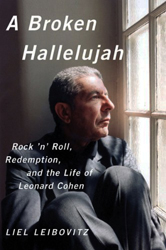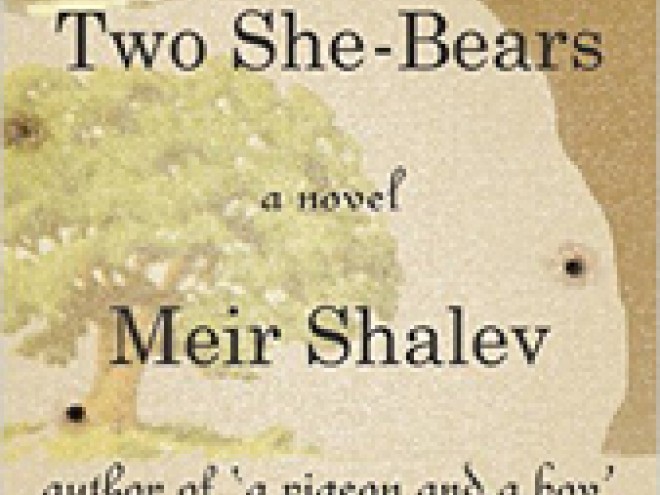Carol

 Last week, in the wake of Donald Trump’s victory and Leonard Cohen’s death, I reached for Liel Leibovitz’s thoughtful and illuminating 2013 meditation on the great poet/songwriter, entitled A Broken Hallelujah. Reading it actually made me feel a little better.
Last week, in the wake of Donald Trump’s victory and Leonard Cohen’s death, I reached for Liel Leibovitz’s thoughtful and illuminating 2013 meditation on the great poet/songwriter, entitled A Broken Hallelujah. Reading it actually made me feel a little better.
I’m also reading The Empire of the Senses, Alexis Landau’s sweeping historical novel set in Berlin between the two world wars and filled with Jewish and gentile characters who are at once united and divided by family ties, national loyalties, and romantic passions.
 Naomi
Naomi
Written in three-parts, Noemi Jaffe’s What are the Blind Men Dreaming? brings together the experiences and reflections of three generations of women: Lili Stern — the author’s mother — a Holocaust survivor whose diary entries open the book; Noemi Jaffe herself, reflecting on her mother’s experiences upon reading her diary and visiting Auschwitz in 2009; and Noemi’s daughter Leda Cartum, as a response to “the power of memory and survival.” Translated from Brazilian Portuguese and Serbian (Lili moved to Brazil from the Balkans following the war), What are the Blind Men Dreaming?is a thoughtful and moving addition to the canon of Holocaust literature.
Suzanne

 Mischling by Affinity Konar is a debut novel of the horrific times in Dr. Menngele’s Auschwitz laboratory. The story alternates between 13-year-old identical twins Pearl and Stasha and the horrific acts of medical experiments that were done to them and thousands of other children. Throughout this novel, there is awful despair but also acts of survival and hope.
Mischling by Affinity Konar is a debut novel of the horrific times in Dr. Menngele’s Auschwitz laboratory. The story alternates between 13-year-old identical twins Pearl and Stasha and the horrific acts of medical experiments that were done to them and thousands of other children. Throughout this novel, there is awful despair but also acts of survival and hope.
I’m also reading The Imperial Wife by Irina Reyn, in which the past and the present collide over a priceless artifact. This is an interesting look at the ambition of two different but similar women.
 Evie
Evie
I thought Helen Maryles Shankman’s In the Land of Armadillos it was strikingly emotive, a glimpse into one small Polish town during World War II. The short stories are electric and heartbreaking, showcasing a the many different sides to one larger story — the regular lives of a people that are thrust into history. The writer has the uncanny ability to craft each story as if it was its own world, yet fit neatly within the others like a puzzle. Each character is finely wrought and complex, often struggling with the mundane details of their everyday lives while under the immense pressure of death hovering over them daily. They are beautiful stories flowing with magic and poetry, as the author inserted a little piece of magic into each one.
Joyce

 Perfect for this time of reflection, Triumph of the Heart: Forgiveness in an Unforgiving World by journalist and award-winning writer Megan Feldman Bettencourt is an emotional journey exploring everything from a mundane slight to crimes that are unthinkable, with teachers from all walks of life who show the way to learning to forgive.
Perfect for this time of reflection, Triumph of the Heart: Forgiveness in an Unforgiving World by journalist and award-winning writer Megan Feldman Bettencourt is an emotional journey exploring everything from a mundane slight to crimes that are unthinkable, with teachers from all walks of life who show the way to learning to forgive.
Becca
The Gustav Sonata by Rose Tremain is about two young boys — one Jewish and one not — growing upon Switzerland after World War II. I love the author’s beautiful but spare writing — the narrative seems so direct that it takes a while to realize how much is left unspoken. I’m also particularly struck by one boy’s concept of Swiss neutrality and self-reliance, which affects his relationships throughout the novel.
Nat

 On recommendation from Naomi, this week I read David Samuel Levinson’s forthcoming novel Tell Me How This Ends Well, in which three adult siblings are forced to contend with their mother’s rapidly declining health in a rabidly antisemitic world six years into the future. I’m also revisiting David Peace’s GB84, a hefty crime novel set against the British coal miner’s strike in of 1984, and yesterday I picked up a copy of The Selfishness of Others: An Essay on the Fear of Narcissism by Kristin Dombeck. It’s one of the most illuminating and all-too-real works of nonfiction I have read this year — it’s all I can do to stop myself from tearing pages directly out of the book and anonymously delivering them to certain mailboxes…
On recommendation from Naomi, this week I read David Samuel Levinson’s forthcoming novel Tell Me How This Ends Well, in which three adult siblings are forced to contend with their mother’s rapidly declining health in a rabidly antisemitic world six years into the future. I’m also revisiting David Peace’s GB84, a hefty crime novel set against the British coal miner’s strike in of 1984, and yesterday I picked up a copy of The Selfishness of Others: An Essay on the Fear of Narcissism by Kristin Dombeck. It’s one of the most illuminating and all-too-real works of nonfiction I have read this year — it’s all I can do to stop myself from tearing pages directly out of the book and anonymously delivering them to certain mailboxes…
Related Content:



